

JULY • VOL. 7 • SERIES OF 2023
INSIGHTS is a monthly publication of BDB LAW to inform, update and provide perspectives to our clients and readers on significant tax-related court decisions and regulatory issuances (includes BIR, SEC, BSP, and various government agencies).

DISCLAIMER: The contents of this Insights are summaries of selected issuances from various government agencies, Court decisions, and articles written by our experts. They are intended for guidance only and as such should not be regarded as a substitute for professional advice.
Copyright © 2023 by Du-Baladad and Associates (BDB Law). All rights reserved. No part of this issue covered by this copyright may be produced and/or used in any form or by any means – graphic, electronic, and mechanical without the written permission of the publisher.
What's Inside ...
- HIGHLIGHTS FOR JULY 2023
- SIGNIFICANT COURT DECISIONS
- Supreme Court
- Court of Tax Appeals
- SIGNIFICANT REGULATORY ISSUANCES
- Bureau of Internal Revenue
- Securities and Exchange Commission
- Bangko Sentral ng Pilipinas
- Bureau of Customs
- PUBLISHED ARTICLE
- Income Tax on Digital
- OUR EXPERTS
- The Personalities
- The Personalities


HIGHLIGHTS for JUNE 2023
COURT DECISIONS
-
Valid service of the FLD is part of the due process requirement in the issuance of a deficiency tax assessment, non-observance thereof renders the deficiency tax assessment void. (Commissioner of Internal Revenue vs. South Entertainment Gallery, Inc., G.R. No. 223767, April 24, 2023)
-
If the offer of compromise is less than the prescribed rates set forth in Section 4 hereof, the same shall always be subject to approval by NEB. (SM Mart, Inc. vs. Commissioner of Internal Revenue, CTA Case No. 9524, June 22, 2023)
-
In appeals from the CIR’s inaction, the CTA is not barred from receiving any and all material and relevant evidence that the taxpayer may produce in support of its claim. [Oceana Gold (Philippines), Inc. v. Commissioner of Internal Revenue, CTA Case No. 10382, June 26, 2023]
-
The RTC does not have the power to rule on the validity or constitutionality of the CIR’s administrative issuances pertaining to the enforcement of the NIRC. It is the CTA that has the jurisdiction to rule on these matters. [Oceanagold (Philippines), Inc. vs. Commissioner of Internal Revenue, CTA Case No. 10103, June 1,2023]
BIR ISSUANCES
- RMO No. 23-2023, June 23, 2023 – This prescribes the mandatory requirements and guidelines, policies and procedures in the processing of claims for Value-Added Tax (VAT) Credit/Refund except those under the authority and jurisdiction of the Legal Group.
- RMO No. 24-2023, June 26, 2023 – This prescribes the revised policies and procedures relative to the accreditation of Cash Register Machines (CRMs), Point-of-Sale (POS) and Other Similar Sales Machines/Software Generating Invoices/Receipts Including Electronic Invoicing or Electronic Receipting System/Software used under a Subscription-Based Agreement.
- RMC No. 65-2023, June 8, 2023 – This amends Item VIII of RMC No. 19-2022 on the venue for the issuance of Certificate Authorizing Registration relative to tax-free exchanges of properties under Section 40(C)(2) of the National Internal Revenue Code of 1997, as amended.
SEC ISSUANCES
-
SEC Memorandum Circular No. 9, June 30, 2023 – This prescribes a further extension of the deadline for amnesty applications under SEC MC No. 2, Series 2023, and streamlining the application process.
BSP ISSUANCES
- BSP Circular No. 1176, June 29, 2023 – This prescribes guidelines for registration of securities for agri-business companies by using SEC FARMS.
BOC ISSUANCES
- CMO No. 12-2023, May 26, 2023 – This provides the guidelines on the issuance of proof of origin, granting of preferential tariff treatment, and verification procedure under the Regional Comprehensive Economic Partnership (RCEP) Agreement.

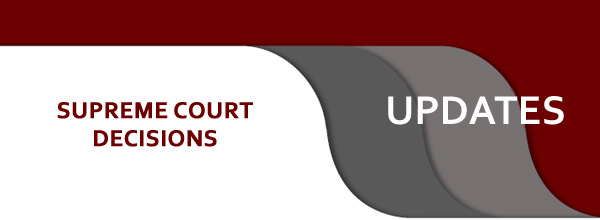
Valid service of the FLD is part of the due process requirement in the issuance of a deficiency tax assessment, non-observance thereof renders the deficiency tax assessment void.
The issue is whether there was sufficient delivery of the Formal Letter of Demand (FLD) by the Commissioner of Internal Revenue (CIR). CIR invokes the ruling in Rubia v. Government Service Insurance System where the Court recognized that service of court processes to the central receiving unit clerk is deemed as valid service if the establishment or institution has a central receiving unit that is authorized to receive all its mails.
Under Sec. 3.1.7 of RR No. 12-99, effecting constructive service involves two requisites: (1) leaving the notice in the premises of the taxpayer, and (2) the fact of such service is attested to, witnessed, and signed by at least two revenue officers other than the revenue officer who constructively served the same. The CIR failed to prove these requisites.
The testimonies of Ocampo and Victoria merely proved that the FLD was served only to an administrative officer of SM City Pampanga, who was allegedly in charge of receiving mail matters for all mall tenants like the taxpayer. However, their testimonies fell short in showing that the Formal Letter of Demand with Details of Discrepancies and Assessment Notice (FLD-DDAN) was either actually or constructively served to the taxpayer or its duly authorized representative, as required by Secs. 3.1.4 and 3.1.7 of RR No. 12-99. The FLD-DDAN was not properly served by registered mail, rendering the deficiency tax assessment void for denial of the taxpayers right to due process.
Since the valid service of the FLD to the taxpayer is part of the due process requirement in the issuance of a deficiency tax assessment, non-observance thereof renders the deficiency tax assessment of the CIR void. (Commissioner of Internal Revenue vs. South Entertainment Gallery, Inc., G.R. No. 223767, April 24, 2023)

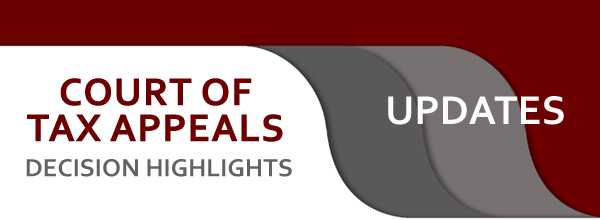
It is well-entrenched in jurisprudence that tax refunds partake in the nature of tax exemptions in that they are strictly construed against the claimant.
On March 16, 2016, the taxpayer allegedly declared a cash dividend of ₱32,000,000.00 in favor of BEPHA. Acting as a withholding agent, the petitioner withheld therefrom the amount of ₱3,200,000.00 representing the 10% Final Withholding Tax (FWT) on dividends, Consequently, on April 18, 2016, the taxpayer filed with RDO No. 048- West Makati its Revised BIR Form No. 1601 to reflect the amount of ₱1,600,000.00, representing the 5% FWT on dividends under the Philippines-Germany Tax Treaty. On even date, the taxpayer also filed an administrative claim for refund for overpayment in the amount of ₱1,600,000.00 and RDO No. 048- West Makati acknowledged receipt's of the same on May 16, 2016. Thereafter, on June 03, 2016, the taxpayer filed for a Tax Treaty Relief Availment (TTRA) for Dividend Income with the BIR ITAD.
The taxpayer maintains that it complied with the requirements under the Philippines-Germany Tax Treaty and hence, is qualified for the application of the 5% preferential tax rate granted under Article w(2)(a) of the same. Thus, it contends that it is entitled to the refund of the excess 5% FWT on dividends which it paid to the BIR. As a general rule, except as otherwise provided in the National Internal Revenue Code (NIRC) of I997, as amended, a foreign corporation not engaged in trade or business in the Philippines shall pay a tax equivalent to 30% of the dividends earned. Such income tax rate may be reduced to 15%, subject to the condition that the country in which the Non-resident Foreign Corporation (NRFC) is domiciled allows credit against the tax due from the NRFC taxes deemed to have been paid in the Philippines equivalent to 15%, which represents the difference between the said regular income tax of 30% and the 15% tax on dividends.
To be entitled to the preferential tax rates, the beneficial owner of the dividends who is a resident of Germany must not carry on business in the Philippines pursuant to Article 10(4) above.
The Court held that while the taxpayer, a domestic corporation, was able to prove that its parent company and controlling stockholder, BEPHA, owns 99.99993% (virtually 100%) of its common shares", and thus, may also be considered as the beneficial owner of the dividends it declared pertinent to the said shares, it nevertheless failed to prove that BEPHA is a resident of Germany. It is well-entrenched in jurisprudence that tax refunds partake the nature of tax exemptions in that they are strictly construed against the claimant. (Croma Medic, Inc. Vs. Commissioner of Internal Revenue, CTA EB No. 2213, June 13, 2023)
The failure of the prosecution to timely file the Information in Court, within the five (5)-year prescriptive period renders the present case dismissible on the ground of prescription.
On April 20, 2023, an information was filed against the taxpayer indicting them of violation of Section 255 of the NIRC of 1997, as amended.
Jurisprudence holds that the offense of willful failure to pay tax is committed after service of notice and demand for payment of deficiency taxes upon the taxpayer. Prescription shall begin to run from the day of the commission of the violation of the law, and if the same be not known at the time, from the discovery thereof and the institution of judicial proceedings for its investigation and punishment. The prescriptive period for tax offenses punishable under the NIRC, as amended is five (5) years.
As claimed by the BIR in its Joint Complaint Affidavit, the FLD dated November 7, 2013 covering the taxable year 2010 was served to and received by the taxpayer on November 15, 2013. On May February 4, 2014, the taxpayer filed its protest. Acting on the protest, a Final Decision on Disputed Assessment (FDDA) was issued on April 27, 2015.
The offense of willful failure to pay tax is committed after the service of notice and demand for payment of deficiency taxes upon the taxpayer. Clearly, based on the receipt of the FLD and the FDDA, the offense charged had already been prescribed when the information was filed before this Court on April 20, 2023. The failure of the prosecution to timely file the Information in Court, within the five (5)-year prescriptive period renders the present case dismissible on the ground of prescription. (People of the Philippines vs. Transtech Shuttle Service, Inc., CTA Crim Case O-1049, June 16, 2023)
If the offer of compromise is less than the prescribed rates set forth in Section 4 hereof, the same shall always be subject to approval by the NEB.
In order to settle, the taxpayer has offered, and the BIR has accepted, the payment of the total amount of ₱44,152,402.06 which is equivalent to twelve percent (12%) of the basic tax assessed for the taxable year 2010. The Court having found the submission of the parties to be sufficient, the Court now resolves the Joint Motion for Approval of the Judicial Compromise Agreement.
A compromise settlement Is deemed valid provided that the following requirements are met:
1) That the application for compromise should be based on either the doubtful validity of the respondent's assessment or the taxpayer's financial incapacity to pay such assessment.
2) In case the basis of the compromise offer is doubtful validity, the minimum payment of compromise settlement shall be at the rate equivalent to forty percent (40%) of the basic assessed tax, while if the ground is financial incapacity, the minimum payment should be at the rate equivalent to ten percent (10%) of the basic assessed tax.
3) The approval of the National Evaluation Board (NEB), which is composed of the respondent and his four (4) deputy commissioners, is required if the subject assessment exceeds one million pesos or where the settlement offered is less than the prescribed minimum rates.
Here, the total payment made by the petitioner only corresponds to 12% of the basic tax assessed in the FDDA. Section 6 of RR No. 30-2002 provides that if the offer of compromise is less than the prescribed rates set forth in Section 4 hereof, the same shall always be subject to approval by NEB. In this case, the Approval sheet of the judicial compromise agreement shows the approval of NEB. Therefore, if the offer of compromise is less than the prescribed rates set forth in Section 4 hereof, the same shall always be subject to approval by NEB. (SM Mart, Inc. vs. Commissioner of Internal Revenue, CTA Case No. 9524, June 22, 2023)
In appeals from the CIR’s inaction, the CTA is not barred from receiving any and all material and relevant evidence that the taxpayer may produce in support of its claim.
The taxpayer filed a judicial claim for refund on the ground of the CIR’s inaction. During trial, the CIR failed to prove that the denial of the administrative claim was received by the taxpayer. When the Court granted the claim for refund, the CIR now moves for reconsideration on the ground that the taxpayer should not have been allowed to present evidence other than those previously submitted to the BIR during the administrative proceedings, citing the SC's decision in Pilipinas Total Gas, Inc. v. Commissioner of Internal Revenue (Total Gas).
The Court denied the motion for reconsideration and found the CIR’s interpretation of Total Gas misleading. The rules in Total Gas are as follows:
1) In appeals from the CIR’s inaction, the Court may accept all evidence that may be presented by the taxpayer since there is no decision appealed from;
2) In appeals from the CIR’s decision where the reason for dismissal is the taxpayer’s failure to submit complete documents despite notice/request, then the judicial claim before the CTA would be dismissible for the taxpayer’s failure to substantiate the claim at the administrative level; and
3) In appeals from the CIR’s decision where the reason for the dismissal is not the taxpayer’s failure to submit complete documents despite notice/request, the taxpayer has to convince the CTA that the CIR had no reason to deny its claim and that it satisfied all the documentary and evidentiary requirements for an administrative claim.
Considering that the CIR’s decision denying the claim for refund does not appear to have been served to the taxpayer, it was proper for the taxpayer to appeal from the CIR’s inaction lest it risks its claim for refund to prescribe. Since the appeal stemmed from the CIR’s inaction, the Court is not barred from receiving any and all material and relevant evidence that the taxpayer may produce in support of its claim in accordance with the rules established in Total Gas. [Oceana Gold (Philippines), Inc. v. Commissioner of Internal Revenue, CTA Case No. 10382, June 26, 2023]
Per the Financial or Technical Assistance Agreement, the taxpayer must show that the collection of excise tax during the Recovery Period resulted in loss or harm to its person or property.
The taxpayer is an assignee-contractor to the Financial or Technical Assistance Agreement (FTAA) entered into by the Republic of the Philippines and Arimco Mining Corporation. The FTAA is explicit that all taxes, including excise tax, collected during the Recovery Period is recoverable during the years they were incurred, provided that the amount collected is detrimental to the taxpayer’s recovery of Pre-operating and Property Expenses. Pursuant to this, the taxpayer filed a claim for refund of excise taxes.
The Court denied the refund claim. The term "detriment" means any loss or harm suffered in person or in property. Thus, per the FTAA, the taxpayer must show that the collection of excise tax during the Recovery Period resulted in loss or harm to its person or property. The taxpayer failed to prove that the payments of the subject excise taxes, during the said five (5)-year period, were detrimental to its recovery of the said Pre-operating and Property Expenses. There was no specific evidence which showed such fact. [Oceanagold (Philippines), Inc. v. Commissioner of Internal Revenue, CTA Case No. 10103, June 1, 2023]
Unlike LRTA, the taxpayer filed a Petition for Review with the CTA before receiving any final decision on its Request for Reconsideration. As such, there is currently no final decision from which the taxpayer can appeal to this Court.
On May 31, 2022, the taxpayer received an FDDA. On June 30, 2022, it filed a Request for Reconsideration with the CIR. Thereafter, on March 10, 2023, the taxpayer received a Warrant of Distraint and/or Levy (WDL) and a Warrant of Garnishment. On March 13, 2023, it filed a Request to Lift the WDL and WG. On April 28, 2023, the taxpayer filed a Petition for Review with the CTA, alleging the similarity of its situation with the taxpayer in the case of Light Rail Transit Authority (LRTA) v. BIR.
The Court dismissed the petition for being prematurely filed. Like LRTA, the taxpayer in the instant case protested the FDDA it had received and opted to wait for the CIR’s decision on the matter. Like LRTA, the taxpayer also protested the Warrants issued against it. Unlike LRTA, however, the taxpayer filed a Petition for Review with this Court before receiving any final decision on its Request for Reconsideration. It did not actually wait for the CIR’s final decision on the assessment dispute, given that the taxpayer's Request for Reconsideration is still pending. The June 30, 2014 Letter from the LRTA Case sees no equivalent here. As such, there is currently no final decision from which the taxpayer can appeal to this Court. (AGM Ventures Enterprises, Inc. v. Bureau of Internal Revenue, CTA Case No. 11144, June 22, 2023)
The RTC does not have the power to rule on the validity or constitutionality of the CIR’s administrative issuances pertaining to the enforcement of the NIRC. It is the CTA that has the jurisdiction to rule on these matters.
The CIR argues that the Court has no jurisdiction over the instant petition. The CIR points out that it is the regular courts that have jurisdiction to assail RMC No. 17-2013.
The Court cited St. Mary’s Academy of Caloocan City, Inc. vs. Hon. Kim Jacinto S. Henares, et al:
“It is the CTA, and not the regional trial courts, that has jurisdiction to rule on the constitutionality and validity of issuances by the CIR”
“The RTC does not have the power to rule on the validity or constitutionality of the CIR’s administrative issuances pertaining to the enforcement of the NIRC. It is the CTA that has the jurisdiction to rule on these matters.
Hence, it is clear that the CTA is endowed with jurisdiction to decide on the constitutionality and/or validity of the administrative issuances of the CIR, such as RMC No. 17-2013. [Oceana Gold (Philippines), Inc. vs. Commissioner of Internal Revenue, CTA Case No. 10103, June 1,2023]

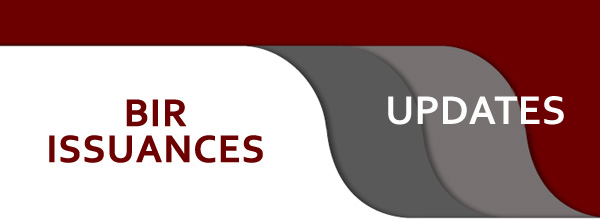
Revenue Memorandum Order No.
21-2023, June 1, 2023 – This prescribes the policies, guidelines and procedures in the disposal of valueless records in the BIR.
The Records Management Division (RMD) in the National Office and Administrative and Human Resource Management Division (AHRMD) in the Regional Offices shall safeguard, adopt appropriate security measures as required in Republic Act No. 10173 (Data Privacy Act of 2012) and follow the applicable rules and regulations of National Archives of the Philippines (NAP) General Circular No. 2 (Guidelines on the Disposal of Valueless Records in Government Agencies) dated January 20, 2009 on the actual disposal of valueless records.
The BIR Records Disposition Schedule (RDS) and/or specific laws and regulations shall be used in determining records/documents for disposal. Only records/documents with a disposal schedule shall be destroyed after completion of its period for storage.
Records/documents to be disposed shall have an item number with records series and period covered as indicated in the BIR Records Disposition Schedule. Periodic review and examination of these records/documents shall be conducted at least once a year to identify valueless records that can be requested for disposal.
Appropriate measures shall be undertaken when disposing personal information or records that contain sensitive information of an individual. Records for disposal shall be segregated from those for further retention, as recommended by the NAP. Disposition of any public records/documents is strictly prohibited without authority from the NAP.
Records/documents that are involved in any case (i.e. criminal, civil, tax, etc.) shall not be disposed until they are finally decided upon or settled. Financial records/documents subject of audit by the Commission on Audit (COA) shall not be disposed until post-audited and finally settled.
Actual disposal shall be witnessed by Authorized Representatives from the BIR, NAP and COA to ensure that the records/documents to be disposed are the same records/documents that were authorized for disposal. The procedures in the disposal of valueless records in the National Office and Regional Offices are specified in the Order.
Revenue Memorandum Order No.
23-2023, June 23, 2023 –
This prescribes the mandatory requirements and guidelines, policies and procedures in the processing of claims for Value-Added Tax (VAT) Credit/Refund except those under the authority and jurisdiction of the Legal Group.
The following are the revenue officials authorized to approve/disapprove the claims for VAT refund/credit pursuant to Section 112 of the Tax Code, as amended:
| Processing Office | Amount of Claim | Approving Revenue Official |
| VCAD | Not more than ₱ 50 Million | Assistant Commissioner (ACIR) Assessment Service (AS) |
| More than ₱ 50 Million up to ₱ 150 Million | Deputy Commissioner (DCIR) Operations Group (OG) |
|
| More than ₱ 150 Million | Commissioner (CIR) | |
| LTVAU | Regardless of amount | ACIR – LTS |
| VATAS/RDO | Regardless of amount | Regional Director |
For VAT refund/credit claims anchored under Sections 204(C) and 229, the thresholds set under RMC No. 17-2018 shall be followed, to wit:
| Amount of Claim | Approving Revenue Official |
| Not more than ₱ 10 Million | Regional Director |
| More than ₱ 10 Million up to ₱ 50 Million | ACIR – AS |
| More than ₱ 50 Million up to ₱ 150 Million | DCIR – OG |
| More than ₱ 150 Million | Commissioner (CIR) |
| Claims filed under the LTS | ACIR – LTS (regardless of the amount) |
Revenue Memorandum Order No.
24-2023, June 26, 2023 –
This prescribes the revised policies and procedures relative to the accreditation of Cash Register Machines (CRMs), Point-of-Sale (POS) and Other Similar Sales Machines/Software Generating Invoices/Receipts Including Electronic Invoicing or Electronic Receipting System/Software used under a Subscription-Based Agreement.
The Order shall cover all types of sales machines and/or software generating invoices/receipts that are used in business to record sales transactions, which shall include the following:
a. Cash Register Machine (CRM);
b. POS System–Bundled POS (both hardware and software) and POS Software;
c. e-Invoicing or e-Receipting System/Software used under a Subscription-Based Agreement;
d. All other similar sales machines/software that will generate printed invoices/ receipts, such as but not limited to:
• Taximeters;
• Handheld or mobile devices linked to a server;
• Unmanned bill, coin, or token-operated machines issuing invoice upon sale; and
• Other sales machines/software issuing invoices/receipts, except Computerized Accounting System.
Registration of POS/CRM/SPM/Other Similar Sales Machine shall be done via the Enhanced eAccreg System (except for e-Invoicing or e-Receipting System/Software used under a Subscription-Based Agreement), wherein a separate revenue issuance shall be provided relative to the Authority to Generate (ATG) for the e-Receipting or e-Invoicing System/Software used under a Subscription-Based Agreement) and shall be processed by the Large Taxpayers (LT) Office/Revenue District Office (RDO) within two (2) days after receipt of the application.
Revenue Memorandum Circular No.
65-2023, June 8, 2023 –
This amends Item VIII of RMC No. 19-2022 on the venue for the issuance of Certificate Authorizing Registration relative to tax-free exchanges of properties under Section 40(C)(2) of the National Internal Revenue Code of 1997, as amended.
In compliance with Section 5 of Republic Act No. 11032 (Ease of Doing Business and Efficient Government Service Delivery Act of 2018), and to properly monitor transactions under Section 40(C)(2) of the Tax Code of 1997, as amended, Item VIII of RMC No. 19-2022 is hereby amended to read as follows:
"VIII. VENUE FOR THE ISSUANCE OF THE CERTIFICATE AUTHORIZING REGISTRATION (CAR):
FOR PURPOSES OF THE ISSUANCE OF THE CAR FOR THE TRANSFERRED PROPERTIES PURSUANT TO THE TAX-FREE REORGANIZATION/EXCHANGE, THE PARTIES TO THE TRANSACTION SHALL, IN ALL CASES, SUBMIT THE DOCUMENTARY REQUIREMENTS LISTED IN ANNEX "B" HEREOF TO THE REVENUE DISTRICT OFFICE (RDO)/LARGE TAXPAYERS (LT) OFFICE HAVING JURISDICTION OVER THE PLACE WHERE THE TRANSFEREE/SURVIVING CORPORATION IS REGISTERED REGARDLESS OF THE NUMBER OF REAL PROPERTIES AND/OR SHARES OF STOCKS INVOLVED IN A TRANSACTION, AND WHETHER OR NOT, THOSE PROPERTIES ARE SITUATED IN VARIOUS LOCATIONS COVERED BY DIFFERENT RDOs/LT OFFICES.
Revenue Memorandum Circular No.
69-2023, June 20, 2023 –
This reverts the rates of Percentage Tax, Minimum Corporate Income Tax, and Regular Corporate Income Tax on proprietary educational institutions and not for profit hospitals, pursuant to RA No. 11534 (Corporate Recovery and Tax Incentives for Enterprises Act [CREATE]).
| Kinds of Tax | Tax Rate | Tax Base |
| Percentage Tax | Three percent (3%) |
General Rule: Exception: |
| Minimum Corporate Income Tax | Two percent (2%) | Gross income of domestic and resident foreign corporations, including offshore banking units and regional operating headquarters |
| Regular Corporate Income Tax | Ten percent (10%) | Taxable income of proprietary educational institutions and hospitals |
Hence, the relevant taxes for taxable year 2023 (effective on July 1, 2023) shall be computed as follows:
Calendar Year
| Period | MCIT/RCIT/PT | Tax Due |
| Gross income/Taxable Income/quarterly sales or receipts from January 1, 2023 to June 30, 2023 | 1% | PhP XXX |
| Gross income/Taxable Income/quarterly sales or receipts from January 1, 2023 to June 30, 2023 | 2%/10%/3% | PhP XXX |
Fiscal Year
| Period | MCIT/RCIT/PT | Tax Due |
| Gross income/Taxable Income/quarterly sales or receipts from X month to June 30, 2023 | 1% | PhP XXX |
| Gross income/Taxable Income/quarterly sales or receipts from January 1, 2023 to X month | 2%/10%/3% | PhP XXX |
Revenue Memorandum Circular No.
71-2023, June 23, 2023 –
This provides streamlined guidelines and mandatory requirements for claims of Value-Added Tax (VAT) Credit/Refund except those under the authority and jurisdiction of the Legal Group.
The "Application for VAT Credit/Refund Claims" (BIR Form No. 1914) shall be received by the processing offices, to wit:
a. The VAT Credit Audit Division (VCAD) in the National Office for claims of direct exporters, regardless of the percentage of export sales to total sales, pursuant to Section 106(A)(2)(a)(1) and 106(A)(2)(a)(6) for sale of goods and Sections 108(B)(2), 108(B)(4), and 108(B)(6) for sale of services, and whose claims are anchored under Section 112(A) of the Tax Code, as amended, except for claims with a mix of VAT zero-rated sales emanating from sales of power or fuel from renewable energy sources pursuant to Section 108(B)(7) of the Tax Code, as amended, in which case, Item 2(b) of the Circular shall apply;
b. Claims of taxpayer-claimants (1) engaged in other VAT zero-rated activities, other than direct exports mentioned in Section (1)(2)(a) of this Order, such as but not limited to renewable energy developers pursuant to Section 108(B)(7) of the Tax Code, as amended, and those with indirect exports classified as effectively VAT zero-rated sales, pursuant to Section 112(A) of the Tax Code, as amended; (2) whose VAT registration has been cancelled or change in the VAT registration status to non-VAT but with accumulated unutilized input taxes pursuant to Section 112(B) of the Tax Code, as amended; and (3) those with claims for, recovery of erroneously or illegally assessed or collected VAT pursuant to Sections 204 and 229 of the Tax Code, as amended, shall be filed at the following offices which have jurisdiction over the taxpayer-claimant:
• The VAT Audit Section (VATAS) in the Regional Assessment Division; or
• The respective Revenue District Office (RDO) if without VATAS; or
• The Large Taxpayers VAT Audit Unit (LTVAU) of the Large Taxpayers Service (LTS).


SEC Memorandum Circular No. 08,
June 22, 2023
This prescribes guidelines for registration of securities for agri-business companies by using SEC FARMS.
An agri-business corporation seeking to register its securities may use SEC Farms and Agri-Business Related Modernization Schemes (FARMS) in lieu of the current SEC Form 12-1 subject to the certain conditions.
Moreover, notwithstanding the requirements under Part I (3)(B)(b)(I)(b)(9) of the Revised SRC Rule 68, an agri-business company that would register its securities through SEC FARMS may engage the services of Group B SEC accredited External Auditors or Auditing Firms subject to specific conditions.
Lastly, notwithstanding the requirements on the submission of Financial Statements under PART II (5) (A)(i) to (vi) of Revised SRC Rule 68, the Commission may allow a registrant company using SEC FARMS to file Financial Statements covering a period less than what is required under the mentioned Rules, provided that:
i. The registrant corporation is able to show that the officers who will be involved in the operation of the agri-business activities relating to the project have a three-year related experience; or
ii. The registrant corporation is able to show that it has a related corporation, either as parent, subsidiary or affiliate that is involved in the same or similar business activity for the last three-years.
SEC Memorandum Circular No. 9,
June 30, 2023
This prescribes a further extension of the deadline for amnesty applications under SEC MC No. 2, Series 2023, and streamlining the application process.
The SEC resolved to further extend the deadline for amnesty applications under MC Nos. 2 and 6 until September 30, 2023 retaining the prescribed amnesty rates under MC 2.
In addition, the SEC prescribed a procedure to streamline the amnesty application process by applying the following:
1. Unified Amnesty Application Form;
2. Removal of Undertaking for Latest Due AFS Submission;
3. Turnaround time for release of confirmation of payment (COP);
4. Complete submission of reportorial requirements; and
5. Refund of overpayment.
It is significant to emphasized that corporations are given only until September 30, 2023 to signify their intent to apply for amnesty, submit the supporting documents and settle the corresponding amnesty fees.

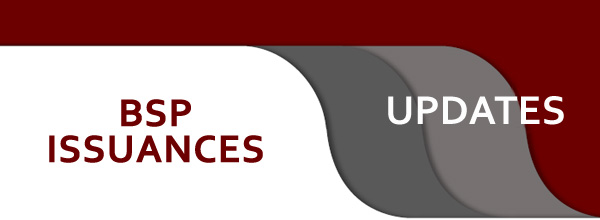
BSP Circular No. 1175 series of 2023
This Circular provides for the reduction in reserve requirement ratios of deposit and deposit substitute liabilities of banks and non-bank financial institutions with quasi-banking functions.
The rates of required reserves against deposit and deposit substitute liabilities effective reserve week 30 June 2023 shall be, as follows:
For Banks
| Reserve Liabilities | UBs/KBs | Digital Banks | TBs | RBs/ Coop Banks |
| a. Demand Deposits | 9.5% | 6% | 2% | 1% |
| b.NOW accounts | 9.5% | 6% | 2% | 1% |
| c. Savings Deposits (excluding basic deposit accounts) | 9.5% | 6% | 2% | 1% |
| d. Time Deposits, Negotiable CTDs, Long-Term Non-Negotiable Tax Exempt CTDs | 9.5% | 6% | 2% | 1% |
| e. xxx | xxx | xxx | xxx | xxx |
| f. Deposit Substitutes (DS) | 9.5% | 6% | 2% | NA |
For Non-Bank Financial Institutions
| Reserve Liabilities | Reserve Requirement |
| Peso-denominated deposit substitute liabilities | 9.5% |
BSP Circular No. 1176,
June 29, 2023
This provides amendments to the rules and regulations on the reserves against deposits and deposit substitute liabilities of banks.
The Monetary Board approved the following amendments to the Manual of Regulations for Banks (MORB) on the rules and regulations governing the rates of required reserves against deposit and deposit substitute liabilities in local currency of banks effective reserve week 30 June 2023, as follows:
1. 9.5% UBs/KBs and 6% digital banks for peso deposits lodged under Due to foreign banks; and
2. 9.5% UBs/KBs and 6% digital banks for peso deposits lodged under Due to Head Office/Branches/Agencies Abroad (Philippine branch of foreign bank).
In addition, Section 252 of the MORB on allowable modes of alternative compliance is further amended allowing peso-denominated loans that are granted to micro-, small-, and medium enterprises (MSMEs) and large enterprises, excluding banks and NBQBs that meet the definition of MSMEs and large enterprises, respectively, subject to certain conditions.

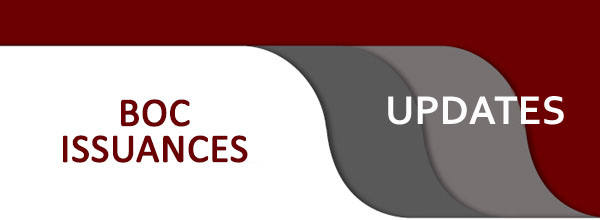
Customs Memorandum Circular No.
94-2023
Reiterating DOF-DO No. 033-2023: Guidelines on the Imposition of Local taxes, Fees, and Charges on Transititioning RBEs
This aims to clarify the rules for transitioning RBEs, or those individual, partnership, corporation, Philippine branch of a foreign corporation or other entity organized and existing under Philippine laws and registered with an IPAs, and whose projects or activities are granted incentives prior to the effectivity of the CREATE Act, insofar as local taxes, fees, and charges are concerned.
The following are the guidelines:
1. On Local Taxes
a. Transitioning RBEs availing of ITH only. All transitioning RBEs which were granted an ITH and classified either as pioneer or non-pioneer under Executive Order No. 226 and/or specified in the registration agreement shall be exempt from local business taxes for the remaining period of the ITH.
All other transitioning RBEs not falling within the immediately preceding paragraph shall be liable for the payment of local business tax in accordance with the provisions of the LGC.
b. Transitioning RBEs currently availing of ITH that are also entitled to the 5% tax on GIE after the ITH. All transitioning RBEs that were granted with ITH shall be guided by Item (a) above. Thereafter, such RBE shall exempt from all local taxes while availing the 5% tax on GIE, subject to the 10-year limitation for both incentives.
c. Transitioning RBEs availing of 5% tax on GIE only. All transitioning RBEs availing the 5% tax on GIE only shall be exempt from all local taxes for a period of 10 years from the creativity of the CREATE Act.
2. On fees and charges. Transitioning RBEs that were granted exemption from local fees and charges under their registration agreements with the concerned IPA, or by their respective LGUs, shall continuously be exempt from fees and charges for a period of 10 years. Otherwise, LGUs may continue collecting such fees and charges if RBEs are liable thereto prior to the effectivity of CREATE Act.
CMO No. 12-2023, May 26, 2023
This provides the guidelines on the issuance of proof of origin, granting of preferential tariff treatment, and verification procedure under the Regional Comprehensive Economic Partnership (RCEP) Agreement
.
This provides the guidelines on the issuance of Proof of Origin, granting of preferential tariff treatment, and verification procedure under the Regional Comprehensive Economic Partnership (RCEP) Agreement.
Procedures for Issuance/Completing a back-to-back Proof of Origin.
1. A back-to-back Proof of Origin may be issued by the BOC or completed by an Approved Exporter provided that:
a. A valid proof of Origin or its certified true copy is presented to the BOC or is in possession of the Approved Exporter for a Certificate of Origin and Declaration of Origin, respectively;
b. The period of validity of the back-to-back Proof of Origin does not exceed the period of validity of the original Proof of Origin;
c. The back-to-back Proof of Origin contains relevant information from the original Proof of Origin in accordance with Annex 3B (Minimum Information Requirements) of the RCEP Agreement;
d. The consignment which is to be re-exported using the back-to-back Proof of Origin does not undergo any further processing in the intermediate Party except for repacking or logistics activities or any other operations necessary to preserve a good in good condition or to transport a good to the importing Party;
e. For partial export shipments, the partial export quantity shall be shown instead of the full quantity of the original Proof of Origin, and the total quantity re-exported under the partial shipment shall not exceed the total quantity of the original Proof of Origin; and
f. Information on the back-to-back Proof of Origin includes the date of issuance and reference number of the original Proof of Origin.
Import Procedures in Granting RCEP Preferential Tariff Rates.
1. Imported goods from RCEP Parties that are originating based on Article 3.2 (Originating Goods) of the RCEP Agreement shall be qualified to claim preferential tariff treatment based on the Philippines’ Schedule of Commitments under EO No. 25, series of 2023.
2. For goods where there is tariff differential, the rate to be applied is the rate allocated for the RCEP Country of Origin of that good pursuant to Sections 5.7.1 and 5.7.2 of this issuance.
3. Notwithstanding Section 5.8.2 of this issuance, the importer is allowed to make a claim for preferential tariff treatment at either:
a. The highest rate of customs duty the RCEP importing Party applies to the same originating good from any of the RCEP Parties contributing originating materials used in the production of such good; or
b. The highest rate of customs duty that the RCEP importing Party applies to the same originating good from any of the RCEP Parties.
4. An original copy of any Proof of Origin must be submitted along with the other pertinent documents before a claim for preferential tariff treatment under the RCEP Agreement can be made.
5. Proof of Origin may be in electronic format. The relevant conditions can be found in the Status of RCEP Parties and Signatory States Issuance/Acceptance of Proof of Origin which can be accessed at the official RCEP website: https://rcepsec.org/rules-of-origin/.
6. The final determination on the rate of duty shall be based from the assessment of the submitted documents from the importer.
Section 6 of this issuance provides for the verification procedures for Imported and Exported Goods covered by Proof of Origin.

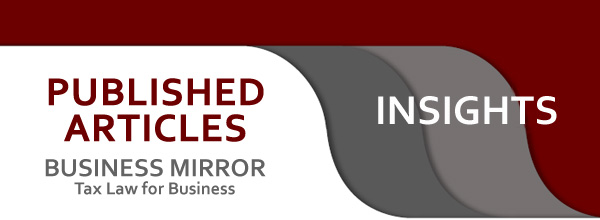
Income Tax on Digital
By Atty. Irwin C. Nidea Jr.
The Supreme Court (SC) in a recent Decision has defined the income source and the situs for tax purposes of satellite communication. This Decision is of particular interest because the legal principles that it espouses may be applicable to the digital economy.
It is interesting to note that the bills that are pending in both houses of Congress as regards digital tax limit the taxation of digital economy to value added tax (VAT). The bills are silent on their income tax exposure. Does the mere silence of the eventual Digital Tax Law make these digital platforms immune from income tax?
Under our income tax law, any foreign corporation is taxable only on income derived from sources within the Philippines. It is subject to final tax on its gross income received during each taxable year from all sources within the Philippines. The tax due shall be withheld at source by the income payor (withholding agent), who shall be responsible for filing the applicable return and remitting the tax withheld to the BIR.
In the case of Aces Philippines (GR 226680, January 30, 2023), the SC ruled that satellite communication that is initiated by a foreign corporation and is transmitted in the country is subject to final withholding tax.
In this case, Aces Philippines entered into an Air Purchase Agreement with Aces Bermuda. Aces Bermuda undertook to provide satellite communication time to Aces Philippines. The Air-Time Purchase Agreement clearly provides that the communication services rely on the entire Aces System consisting of a satellite that is interconnected with terminals and gateways. The technology was designed in such a way that local service providers (e.g., Aces Philippines) can access, connect to, and use the Aces Satellite System. In turn, the local service providers can cater to their local subscribers (e.g., Philippine subscribers) whose calls require access to the Aces Satellite System to be able to contact and be connected to another mobile/landline number. Thus, the fulfillment of Aces Bermuda's undertaking requires the satellite to have transmitted/routed the call and a gateway to have received the call as routed by the satellite. At the point of transmission, Aces Philippines has not been given access to the Aces System yet. It is only when the call is actually routed to its gateway that Aces Philippines is able to connect its local subscriber to the intended recipient of the call. In this sense, the gateway's receipt of the call signifies completion/delivery of Aces Bermuda's service. 2) The accrual of satellite air time fees marks the inflow of economic benefits.
The setup is very similar to digital platforms. Amazon or Netflix are based in another country. But they are able to cater to their local subscribers directly or through their branches or offices in the Philippines. Clearly, they enjoy economic benefits. By analogy with the Aces Philippines case, the situs of the income-producing activity is in the Philippines. In the Aces Philippines case, the income-generating activity is directly associated with the gateways located within Philippine territory. Aces Philippines admits that the gateway's receipt of the call as routed by the satellite (i.e., second segment of Aces System) takes place in the Philippines. Similarly, when subscribers of digital platforms click on their computers and they are able to buy or watch a movie using these platforms, while in the Philippines, the situs where they derive economic benefit is clearly in the Philippine territory.
Satellite communication and the internet are very similar. They have no boundaries. Foreign jurisprudence and foreign statutes have exempted satellite communication from income tax. The SC is aware of this. But its hands are tied. It can only interpret what our law provides, i.e., when there is economic benefit, non-resident foreign corporation is subject to income tax and the payor of the income to the non-resident foreign corporation must withhold the tax.
Are Netflix, Amazon, and Youtube liable to income tax? Yes, if we follow the principles laid down in the Aces Philippines case.
Our present bills on digital tax require foreign digital companies to register in the country with the promise that they will only be charged VAT and not income tax. If the intention is not to subject these companies to income tax, an express provision exempting them from such must be included in the law. Otherwise, a decision like the Aces Philippines case may arise. If this happens, it will be open season for tax assessments and our country will lose the confidence of the digital world.
----------------------------------------------
For inquiries on the article, you may call or email
ATTY. IRWIN C. NIDEA JR.
Senior Partner
T: +63 2 8403 2001 loc. 330
This email address is being protected from spambots. You need JavaScript enabled to view it.



DISCLAIMER: The contents of this Insights are summaries of selected issuances from various government agencies, Court decisions and articles written by our experts. They are intended for guidance only and as such should not be regarded as a substitute for professional advice.
Copyright © 2023 by Du-Baladad and Associates (BDB Law). All rights reserved. No part of this issue covered by this copyright may be produced and/or used in any form or by any means – graphic, electronic and mechanical without the written permission of the publisher.






